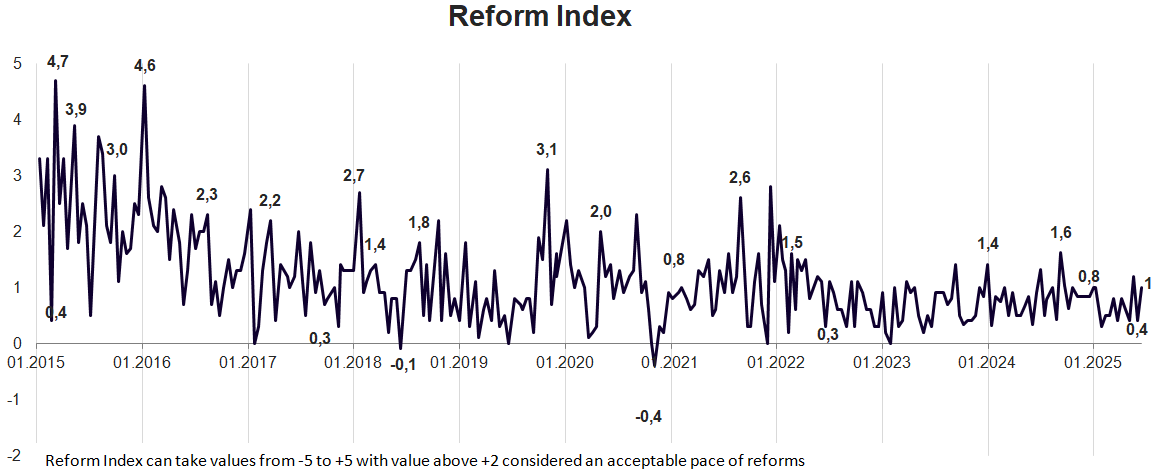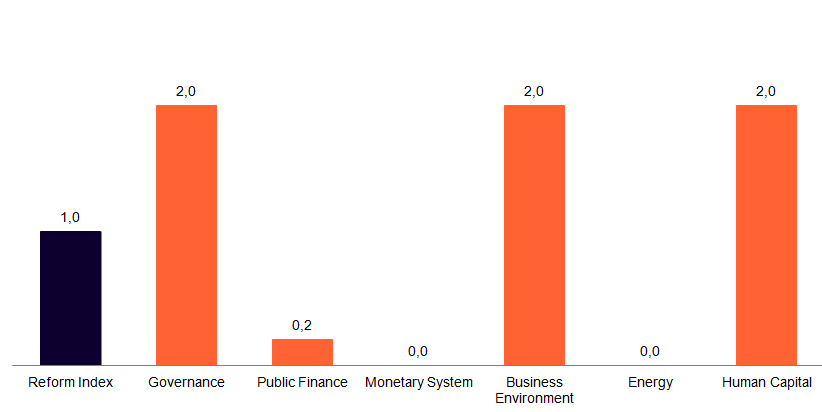Early June marked a productive period for reforms. Between June 2 and 15, Reform Index experts recorded nine reforms, all of which received positive evaluations.
Issue 266 highlights two EU integration laws, each of which received 2 points on the Index’s -5 to +5 scale—a score that, in our view, differentiates substantial changes from less noticeable ones. The first law completes the legislative groundwork for Ukraine’s accession to the EU Single Digital Market and the implementation of the Roam Like at Home (RLAH) policy. The second law reforms the civil service pay system, replacing the outdated model of salaries and bonuses with a European-style structure based on job classification. The overall Reform Index score for this period is +1.0, up from +0.4 in the previous issue.
Graph 1. Dynamics of the Reform Index

Graph 2. Values of the Reform Index and its Components in the Current Assessment Round

Ukraine’s Integration into the EU Single Digital Market, +2 points
On April 17, 2025, the Verkhovna Rada passed Law No. 4345-IX, completing Ukraine’s legislative preparations for implementing EU laws on roaming and for integration into the EU’s Single Digital Market.
The law allows European telecom operators to bypass Ukraine’s complex registration procedures if they do not plan to establish a business presence in the country but only intend to cooperate with Ukrainian operators—such as by transmitting signals, using Ukrainian networks, or serving EU-based subscribers. The EU applies a similar approach to non-resident operators.
Special attention is given to the powers of the national regulator—the National Commission for the State Regulation of Electronic Communications (NCEC). It will now be responsible not only for the domestic communications market but also for ensuring effective coordination between Ukrainian and European networks. In particular, it will ensure technical interoperability, promote stable connectivity for subscribers regardless of the operator or technology used, and help Ukrainian users promptly resolve any issues that arise when interacting with European providers.
On July 14, 2025, the European Commission approved granting Ukraine “roaming visa-free” status—that is, integration into the Roam Like at Home policy. As of January 1, 2026, Ukrainians will be able to use mobile services across EU countries without additional charges, and EU subscribers will likewise face no extra costs while using mobile services in Ukraine.
Expert commentary
Stanislav Yukhymenko, Research Fellow at the Institute for Economic Research and Policy Consulting
“Law No. 4345-IX completes the core phase of aligning Ukrainian legislation with the European Union’s ‘Roam Like at Home’ (RLAH) roaming zone.
The law significantly strengthens the role and powers of the National Commission for the State Regulation of Electronic Communications, Radio Frequency Spectrum, and the Provision of Postal Services (NCEC). The NCEC is now equipped with instruments equivalent to those available to national regulators in EU member states under the European Electronic Communications Code. These include oversight of operators and enforcement of service access, monitoring of tariffs for regulated services, ensuring operator compliance with fair use policies, and more. Crucially, as the regulator’s powers expand, so too does the importance of ensuring its independence.
The European Commission has already issued a positive assessment of Ukraine’s legal framework. It proposed that the EU Council invite Ukraine to join the EU roaming zone starting January 1, 2026—a proposal the Council has since endorsed.
Implementing this legislation will impose substantial costs on Ukrainian mobile operators. They will need to invest heavily in upgrading their billing and IT systems to comply with RLAH requirements. Although the government, represented by the Ministry of Digital Transformation, has pledged to support operators, the primary financial burden will nonetheless fall on the private sector.
Joining the EU roaming network will allow Ukrainians to use their domestic mobile plans across EU countries without incurring additional charges. Likewise, EU citizens traveling in Ukraine will be able to use their home plans at no extra cost. This move will foster deeper integration into the EU digital market overall, as it will necessitate closer cooperation between Ukrainian and EU telecom operators.”
Civil service pay reform, +2 points
Ukraine has implemented a new remuneration system for civil servants. Under this system, all government employees are now categorized into job families (such as analysts, managers, administrative support, etc.) and levels (entry, intermediate, senior, and managerial). This structure enables the comparison of civil service positions with equivalent roles in the private sector and allows salaries to be aligned with market rates.
Civil service pay will consist of two components: fixed and variable. The fixed component is a guaranteed payment that includes the base salary and allowances (such as for rank or length of service). It is guaranteed that the base salary will be no less than 2.5 times the subsistence minimum for non-disabled persons as of the beginning of the year (i.e., no less than UAH 7,570).
The variable component includes performance-based bonuses awarded for initiative, timely and high-quality task completion, or taking on additional responsibilities. However, these bonuses are subject to caps. The total annual bonus amount must not exceed 30% of the fixed annual salary; a monthly bonus may not exceed 30% of the base monthly salary for the month in which it is granted; and a quarterly bonus may not exceed 90% of the base monthly salary for the corresponding quarter. This change in the civil service pay system was one of the requirements under the Ukraine Facility Plan and is, overall, a necessary (though not sufficient) condition for improving the quality of the civil service.
Expert commentary
Andrii Zabolotnyi, Expert on “Governance: Policy-Making, Accountability, Civil Service” at the Centre of Policy and Legal Reform
“In March 2025, the Verkhovna Rada of Ukraine passed Law No. 4282-IX ‘On Amendments to Certain Laws of Ukraine on Introducing Unified Approaches to Civil Service Remuneration Based on Job Classification.’ Adoption of this law in the first quarter of 2025 was one of the performance indicators under the Ukraine Facility Plan. However, the President did not sign it into law until June 2025.
The law contains several positive elements, including:
- A structured pay system, where the core component of remuneration consists of a clearly defined base salary, supplemented by bonuses for years of service and rank, while the variable part includes capped bonuses and compensation for access to state secrets.
- Preservation of the requirement to approve a unified Procedure for forming the payroll fund within public agencies—a norm introduced in the 2019 Civil Service Law but only recently implemented, and so far only formally, without real standardization. As a result, large amounts of budgetary funds—tens of billions of hryvnias annually—are allocated in a non-transparent manner and without uniform rules.
- An increase in the minimum base salary for local-level civil servants to no less than 2.5 times the subsistence minimum for non-disabled persons (up from the current 2 times).
- The stated intention to legally establish a mechanism for calculating and capping the number of civil servants.
- A mandate to compare remuneration levels for typical civil service positions with corresponding roles in the private sector.
However, the law is not without its shortcomings. First, the title of the law—which promises the introduction of unified approaches to civil service remuneration—does not correspond to its content, as it includes numerous exceptions and special provisions for certain public bodies. For example, a separate salary scale is defined for the State Audit Service and its regional branches, even though this provision was not part of the bill during its first reading. Similarly, the Apparatus of the Verkhovna Rada is granted its own salary scale and catalog of typical civil service positions. Separate pay rules are also introduced for bodies governed by special legislative acts (e.g., NABU, the Economic Security Bureau, the NACP). By legal status, these are central executive authorities, and their employees perform work as complex and responsible as that of staff in equivalent positions in other institutions—such as in legal support or international cooperation.
Moreover, all public bodies are divided into three groups with different base salary levels, but there are no transparent criteria for determining which body falls into which group. For example, the Court Security Service, Maritime Administration, and State Inspectorate for Architecture and Urban Planning are placed in the same category as ministries—even though their functions and levels of responsibility differ significantly. This can result in situations where a civil servant performing complex legal work earns less than someone with simpler duties, solely because they belong to different groups. The European Commission has also highlighted this issue.
Second, the mechanism for oversight of the job classification process is lost. The National Civil Service Agency (NCSA), which serves as the central executive body responsible for civil service, will no longer verify or approve job classifications in the Apparatus of the Verkhovna Rada, the Government Secretariat, the Office of the President, the Central Election Commission, the Constitutional Court, the Supreme Court, higher specialized courts, the High Council of Justice, the High Qualification Commission of Judges, the Office of the Prosecutor General, and others.
Another concern is a provision that allows the Cabinet of Ministers to unilaterally set additional adjustment coefficients for salaries across different public bodies during martial law and for six months after its conclusion. This grants the government excessive discretion in making such decisions and poses corruption risks in determining who receives which coefficients during this period.
So, despite the law’s positive aspects, it ultimately fails to establish genuinely unified approaches to civil service remuneration and does not ensure implementation of the European Commission’s recommendations.”
Reform Index from VoxUkraine aims to provide a comprehensive assessment of reform efforts by Ukraine’s authorities. The Index is based on expert assessments of changes in the regulatory environment in six areas: Governance, Public Finance, Monetary system, Business Environment, Energy, Human Capital. Information about the Reforms Index project, the list of Index experts and the database of the regulations assessed are available here.
Attention
The author doesn`t work for, consult to, own shares in or receive funding from any company or organization that would benefit from this article, and have no relevant affiliations



